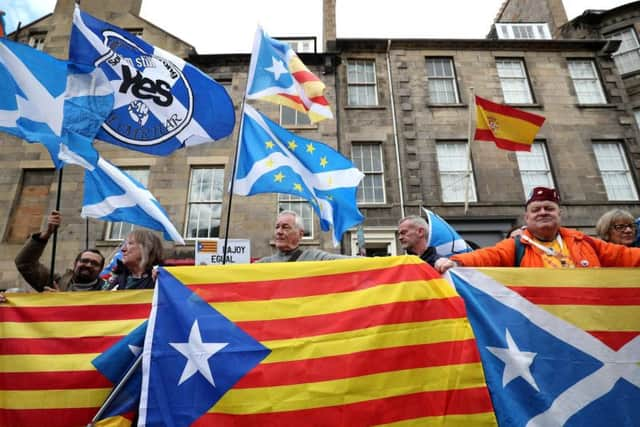Why Catalonia remains deadlocked over independence
Clara Ponsati was last week granted bail by an Edinburgh court after authorities in Madrid began a fresh bid to have the former Catalan minister extradited from Scotland.
The St Andrews University academic - who denies any wrongdoing - is wanted by federal prosecutors in Spain for her involvement in the hugely controversial Catalan independence referendum in 2017.
Advertisement
Hide AdAdvertisement
Hide AdPonsati faces a single charge of sedition and will return to court on December 12. Meanwhile, the independence debate continues to rage in Catalonia.


“Public opinion in Catalonia has not changed," Daniel Cetrà, a research fellow at the University of Edinburgh's Centre on Constitutional Change, told The Scotsman.
"Support for independence continues to poll at around 45 per cent while support for a negotiated independence referendum polls at 70 per cent.
"It is remarkable how Catalan public opinion remains similar - despite several momentous events in the past two years including a failed declaration of independence in 2017, direct rule from Madrid during eight months, and the sentencing of Catalan leaders to 9-13 years in jail.
"The independence movement is not strong enough to force a referendum or a break-up, nor are Spanish leaders able to make offers or create a common project which is appealing enough in Catalonia to settle the issue. Hence the deadlock."
Cetrà has closely followed closely both the Scottish and Catalan independence campaigns. Originally from Barcelona, he moved to Scotland to study in 2010.
Differing viewpoints
Public opinion remains split in Spain over how the Madrid authorities have handled the prosecution of several Catalan leaders in the aftermath of the 2017 independence vote.
"A recent poll showed that almost 50 per cent of Spaniards view the recent trial as 'fair and proportionate' while 22 per cent view it as 'too soft' and only 20 per cent as 'too harsh'," he added. "In addition, 67 per cent oppose any form of amnesty or pardon.
Advertisement
Hide AdAdvertisement
Hide Ad"Public opinion in Catalonia is the exact opposite. Politically, there has been a hardening of positions on Catalonia which was evident in the recent general election campaign. The rise of the far-right Vox is a partial consequence of events in Catalonia, while the Socialists ran an unusually tough campaign on the independence movement and even the leftist Podemos toned down their defense of a referendum in Catalonia.
So what chances are there of a devolved Catalan government ever attempting another independence referendum?
"Another unilateral referendum is very unlikely indeed," continued Cetrà. "While the independence movement is divided, it is gradually moving towards a more pragmatic road map.
“This movement is led by the ERC, which is the ideological equivalent of the SNP and now the strongest Catalan pro-independence party. There is no social appetite for another unilateral referendum either.
"It is true that current Catalan president Quim Torra hinted at a new independence referendum a few weeks ago but he lacks the support of the other pro-independence parties, and even of some members of his own party."
